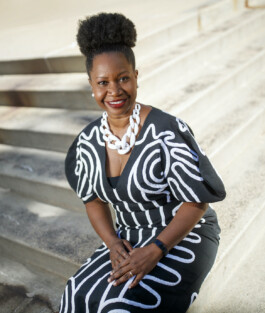Deirdre Cooper Owens
Slavery's Hospitality and the Extraction of the Black Body
March 27, 2022
Lincoln, NE-based, internationally renowned scholar Deirdre Cooper Owens critically considers a salient contradiction at the heart of the institution and practice of slavery: the production of disability. Cooper Owens explores the relationship between hospitality’s double edge and the ideological construction of Black bodies, their value, and Black life.
As an institution, racialized chattel slavery in the United States existed to serve the interests of the slaveholding elite. The extraction of Black people’s labor rested on white people’s ideas about the hospitable nature of Black servility and Black bodies. Black people’s reproductive labor helped form the basis of what Cooper Owens terms the “medical superbody.” Specifically, enslaved women’s bodies, deemed to possess masculinized strength, were regarded as vessels for the proliferation of slavery and as sites to develop cures for white women. Further, Black people were seen as both inferior (intellectually and morally) and superior (physically). As a result, they were typically described as able-bodied subjects. Yet, the inhospitable and extractive nature of slavery also created disabled Black bodies. But disability, as seen through non-normative bodies, is the ultimate sign of unsuitability in slavery. How do we make sense of this contradiction? Using disability studies and Black feminist theory, Cooper Owens will interrogate how notions of hospitality, labor, and ability/disability informed ideologies about Black productivity, value, and life.

BIOGRAPHY
Dr. Deirdre Cooper Owens is the Charles & Linda Wilson Professor in the History of Medicine and Director of the Humanities in Medicine Program at the University of Nebraska-Lincoln. She is also Director of the Program in African American History at The Library Company of Philadelphia. Her award-winning book Medical Bondage: Race, Gender and the Origins of American Gynecology (University of Georgia Press, 2017) has just been translated into Korean.

PROGRAMS
Deirdre Cooper Owens

Slavery's Hospitality and the Extraction of the Black Body
March 27, 2022
Lincoln, NE-based, internationally renowned scholar Deirdre Cooper Owens critically considers a salient contradiction at the heart of the institution and practice of slavery: the production of disability. Cooper Owens explores the relationship between hospitality’s double edge and the ideological construction of Black bodies, their value, and Black life.
As an institution, racialized chattel slavery in the United States existed to serve the interests of the slaveholding elite. The extraction of Black people’s labor rested on white people’s ideas about the hospitable nature of Black servility and Black bodies. Black people’s reproductive labor helped form the basis of what Cooper Owens terms the “medical superbody.” Specifically, enslaved women’s bodies, deemed to possess masculinized strength, were regarded as vessels for the proliferation of slavery and as sites to develop cures for white women. Further, Black people were seen as both inferior (intellectually and morally) and superior (physically). As a result, they were typically described as able-bodied subjects. Yet, the inhospitable and extractive nature of slavery also created disabled Black bodies. But disability, as seen through non-normative bodies, is the ultimate sign of unsuitability in slavery. How do we make sense of this contradiction? Using disability studies and Black feminist theory, Cooper Owens will interrogate how notions of hospitality, labor, and ability/disability informed ideologies about Black productivity, value, and life.
BIOGRAPHY
Dr. Deirdre Cooper Owens is the Charles & Linda Wilson Professor in the History of Medicine and Director of the Humanities in Medicine Program at the University of Nebraska-Lincoln. She is also Director of the Program in African American History at The Library Company of Philadelphia. Her award-winning book Medical Bondage: Race, Gender and the Origins of American Gynecology (University of Georgia Press, 2017) has just been translated into Korean.
